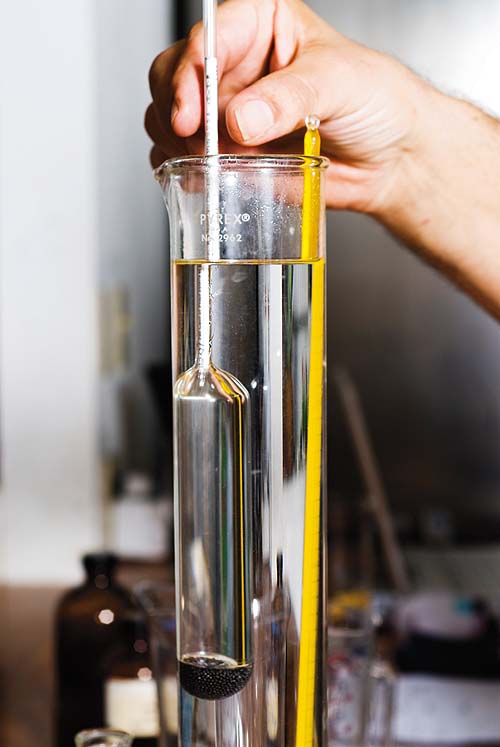 A tanned, barefoot Rod “Harry” Harris splashed some amber whiskey into glasses from aboard the RoLin, his 70-foot yacht moored in Portland’s RiverPlace marina. Harris helped make the spirit himself at House Spirits, a small-batch distillery in Portland, as part of the Whiskey Your Way program, which allows participants to blend and age their own 15-gallon barrel of whiskey for $4,900.
A tanned, barefoot Rod “Harry” Harris splashed some amber whiskey into glasses from aboard the RoLin, his 70-foot yacht moored in Portland’s RiverPlace marina. Harris helped make the spirit himself at House Spirits, a small-batch distillery in Portland, as part of the Whiskey Your Way program, which allows participants to blend and age their own 15-gallon barrel of whiskey for $4,900.
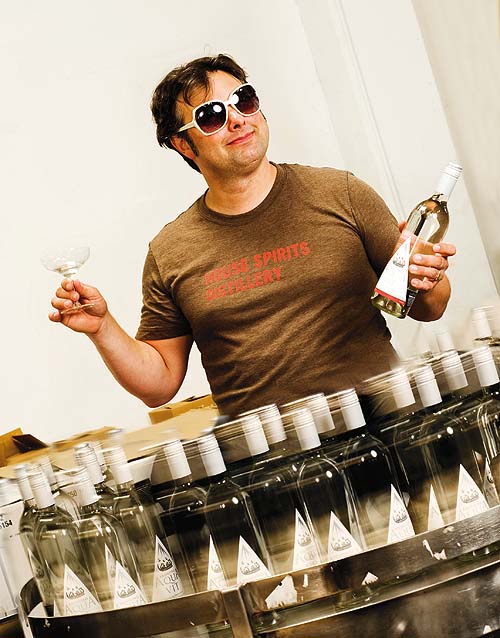 |
Christian Krogstad of House Spirits Distillery on the bottling line of his Krogstad Aquavit, a liquor based on a traditional Scandinavian recipe. Krogstad is a founding member of House Spirits, which hopes to take on investors to grow its business. |
SHAKEN AND STIRRED
STORY BY LUCY BURNINGHAM // PHOTOS BY PAULA WATTS
A tanned, barefoot Rod “Harry” Harris splashed some amber whiskey into glasses from aboard the RoLin, his 70-foot yacht moored in Portland’s RiverPlace marina. Harris helped make the spirit himself at House Spirits, a small-batch distillery in Portland, as part of the Whiskey Your Way program, which allows participants to blend and age their own 15-gallon barrel of whiskey for $4,900.
The liquid got him thinking. Two years into retirement, he needed a project. And not only did he like whiskey, he liked the liquor industry. Harris started talking about buying a controlling interest in House Spirits; founding owner Christian Krogstad was ready to grow the business. Harris saw the possibility as a karmic extension of his past life. “I’m trying to give a little love back to some entrepreneurs, which I didn’t have time to do when I was running my own business,” he says.
Harris founded Harry’s Fresh Foods in 1978, a fresh and prepared foods company in Portland. When he sold the company in 2007, it was reporting $70 million in annual sales. With experience running such a large-scale business, and available capital, Harris and like-minded investors represent a ripe opportunity for the local artisan distilling industry. While Harris decided not to invest in House Spirits, Krogstad had discussed developing a national brand that would eventually entice a large, national buyer. “These guys just need capitalization and a strong plan,” Harris says.
| {artsexylightbox singleImage=”/images/stories/articles/archive/aug2010/slideshow-intro-distilleries.jpg” path=”/images/stories/articles/archive/aug2010/Slideshow/”}{/artsexylightbox} |
It’s a need many of Portland’s artisan distillers share, a fact that’s become increasingly obvious during the past year. The city’s high concentration of local distillers, which produce everything from organic vodkas to fruit brandies, has inspired countless articles and glowing reviews from local and national publications. But the high profile doesn’t erase the financial challenges. The Oregon Distillers Guild has 19 members, up from 16 since 2008, but it’s the loose collection of four Eastside Portland craft distillers who call themselves Distillery Row that is a more accurate microcosm of the evolving industry. Tough times have forced some to close, while survivors are eyeing the possibility of fast growth.
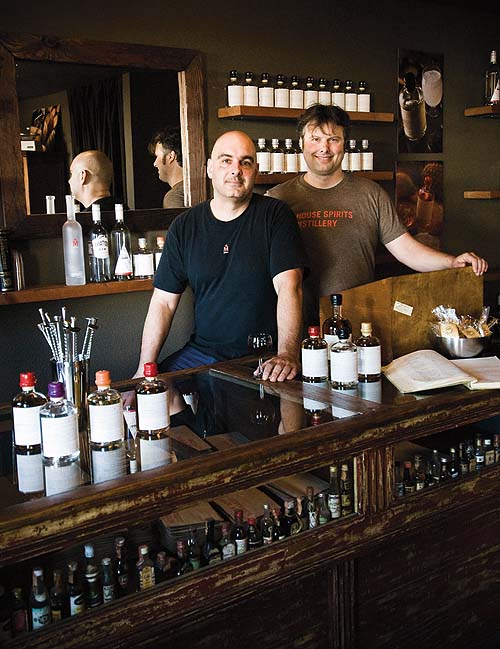 |
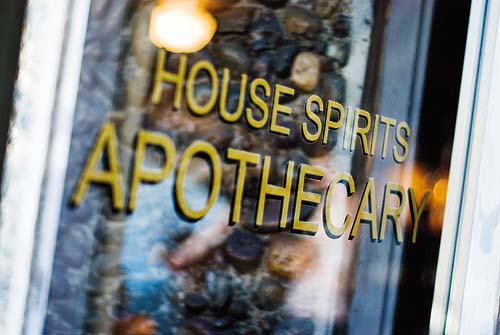 |
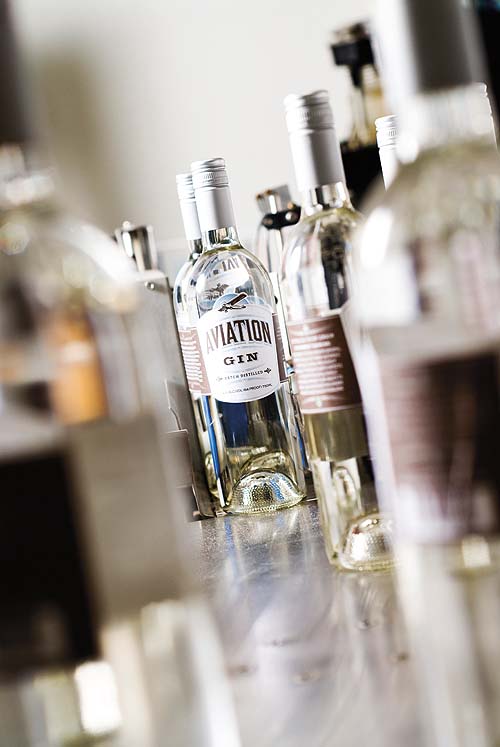 |
Lee Medoff (left) and Christian Krogstad (right), the founders of House Spirits, are parting ways. Medoff plans to open a new distillery called Bull Run Distillery in Northwest Portland. House Spirits will continue to offer tastings of its Aviation Gin and other spirits in the onsite Apothecary room. |
Within House Spirits, the most recognized label on Distillery Row, founding owner Lee Medoff is parting ways with Krogstad to open a new distillery called Bull Run Distillery in Northwest Portland. Medoff, a beer brewer before he became a distiller, compares distilleries to craft brewing 20 years ago. Back then passionate but inexperienced brewers over-supplied the market until more focused businesses rose to the top of the barrel.
“The first flush of excitement is leading into a more expansive approach,” Medoff says. “Now distillers are saying, ‘I love spirits and I’m going to go do this, but I’m going to go into it with a really good business plan.’”
David Ozgo, chief economist for the Distilled Counsel of the United States, says it’s not unrealistic for those business plans to include future buyouts. He says the nation’s 250 craft distillers (up from merely a handful in 2000) aren’t competing with the major distilling companies, such as Bacardi, Diageo and Jim Beam, because they’re developing local, niche markets. Someday, craft distillers and those niche markets could entice corporate distillers into buyouts, Ozgo says. “It hasn’t happened on any great scale just yet, but I suspect the day is coming.”
Erik Martin, president of the Oregon Distillers Guild, agrees. “There will come a time when national brands will buy out smaller local brands, following the same form as the microbrew market,” he says. “Many of the microbrews out there are not owned by small companies but are actually owned by the big guys.”
While 28 companies hold Oregon distillers licenses, only a handful distill from scratch; many import spirits or bottle finished products. The Oregon Liquor Control Commission has no way of classifying “craft distillers.” As a whole, the broad category of Oregon distillers sold $413 million worth of spirits from May 2009 to May 2010.
But for now, House Spirits’ ambitious growth plans remain an anomaly on Distillery Row.
The Row itself was formed last year as an afterthought, Martin says. “It was like, ‘Hey, we’re all neighbors, so let’s work together,’” he says. Common goals among Distillery Row members included sharing tasting room hours, printing maps, promoting the Row through hotels and eventually producing signage.
Up until April, Martin with a co-owner ran Artisan Spirits from a warehouse on the east side, and was one of the five original members of Distillery Row. “While it was nice to have the visibility of being a part of Distillery Row, any cash flow from being part of the Row was minimal,” Martin says. In part, he blames the distillery’s location, which lacked direct street access.
Even so, Martin says that with a staff of just three people, it was hard to cater to visitors. “Being a small operation where each of us [the principals of the company] have day jobs, our main production time was during the weekends when we would get the most walk-in traffic,” he says.
“Though I enjoyed taking the time to speak with each and every visitor, many times it would serve as a distraction from the task at hand — distilling.”
Artisan has since closed the distillery and is looking to outsource its vodka production. In the meantime, they continue to sell leftover product. While the future for Artisan remains murky, Martin refuses to admit defeat.
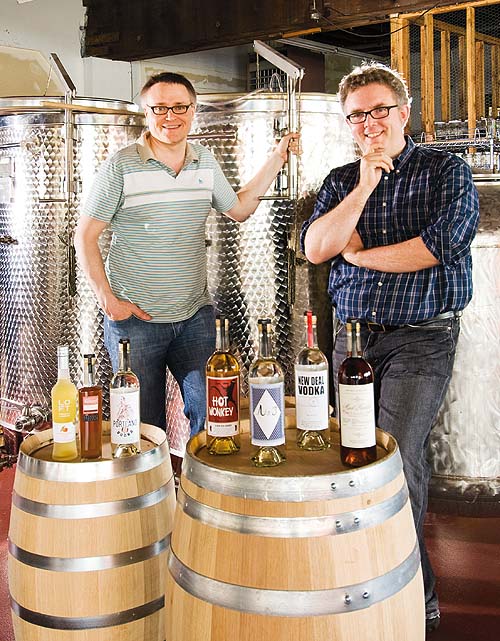 |
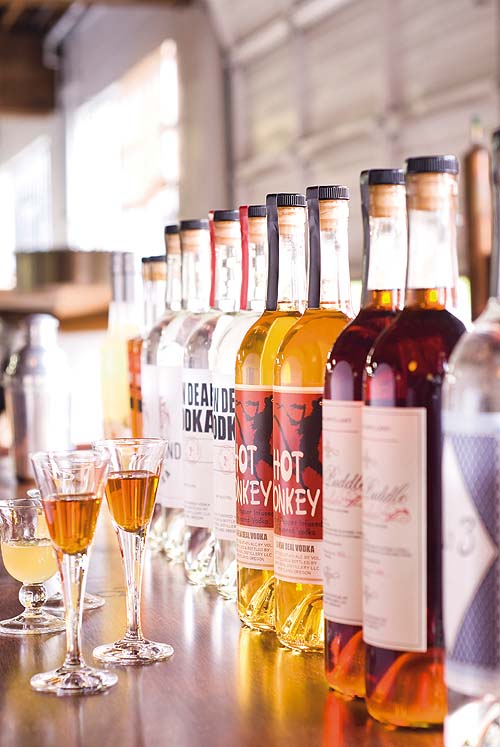 |
Tom Burkleaux (left) and Matthew VanWinkle funded the startup of New Deal Distillery themselves. The business partners continue to work day jobs as they grow the business. They produce spirits for outside clients, a common strategy in an industry with high overhead costs and a required federal license for a distilling space. |
Like Martin, Tom Burkleaux and Matthew VanWinkle, the owners of New Deal Distillery in Southeast Portland, lead double lives. For the past six years, they’ve spent weekdays in an office, where they crunch code as programmers at the same company. At night and on weekends, they become craft distillers — monitoring stills, ordering glass bottles, coordinating label designs and keeping an eye on cash flow.
In 2004, New Deal opened in a 120-square-foot room in ActivSpace in Southeast Portland with $3,000 of starting seed from Burkleaux’s and VanWinkle’s personal credit cards. Two years ago they maxed out the rest of their credit cards to move across the street, into the distillery’s current 5,000-square-foot space, where they produce a line of vodkas.
“Now New Deal is supporting itself, and I’m repairing my balance sheet,” says Burkleaux. “I’m glad we got to this point. If we didn’t believe in this industry, it would have been easy to get discouraged.”
With the additional space, New Deal was able to begin producing spirits for outside clients, including Loft Liquors and J. Witty Spirits, both based in the Bay Area. These types of subleasing partnerships are common in the industry, which has high overhead costs and a required federal license for a distillery’s physical space.
Burkleaux says he’s finally reached a point where he can seriously consider phasing out his day job, especially as New Deal works toward developing brandy, gin, whiskey and moonshine. Still, he warns prospective distillers about the financial realities of the industry.
“I don’t think it’s the route to fabulous wealth and riches, but hopefully you can find a sustainable living, express some creativity and be part of the community,” he says.
Unfortunately for Highball Distillery, another dot on the Distillery Row brochures that no longer exists, circumstances took a less fortuitous turn. In March of this year, Highball lost its lease, which spooked one of the two founding business partners, who backed out of the project entirely.
Highball founder and current owner Michael Heavener is trying to figure out how to re-establish the business before his existing stock of organic vodka runs dry. In the meantime, his homemade distilling equipment is collecting dust in storage at Integrity Spirits.
The equipment itself poses a problem; when assembled, Highball’s stills are too big to fit in any existing Distillery Row space. That’s because Highball took the purist approach to distilling by starting with whole, organic wheat and boiling it into a mash, instead of starting with a purchased neutral grain spirit, the common practice for most craft distillers.
The extra step meant extra costs, so Highball was forced to sell one bottle of vodka for $35, a high price point during a recession. “Our vodka was the same price as Grey Goose, but it was a local and organic product,” Heavener says. “But the marketing blitz of Grey Goose was tough to contend with.”
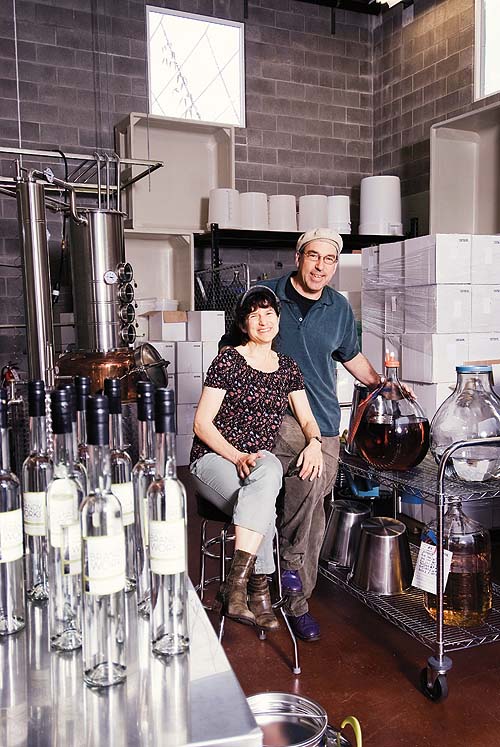 |
Sebastian and Erika Degens bottle a batch of pear brandy, which was distilled from 800 pounds of Hood River pears. The Degans recently received approval to sell their products from their new tasting room, the most recent addition to Distillery Row. |
These types of challenges don’t come as a surprise to veteran distiller Stephen McCarthy, who other Portland distillers refer to as “Grandpa McCarthy.” “They’re dealing with thin capitalization and little business experience,” he says. “You’ve got to have deep pockets to make an initial investment and still be smiley. Then you’ve got to be willing to work extremely hard for a long time.”
Twenty-five years after founding Clear Creek Distillery, which produces grappas and eaux de vie from Oregon fruits and herbs on Portland’s west side, McCarthy says his business only became profitable during the last few years, with the past year making a record $1.25 million in net sales.
Because most of Oregon’s distillers aren’t making spirits from scratch, like he does, McCarthy says they’re left to compete with big national brands with huge marketing budgets.
And even the most well-made products backed by a genuine story can be a tough sell, he says. “You have to hammer your way into the marketplace,” McCarthy says. “After 25 years, most of the sales trips I make are extremely productive, but that wasn’t always the case.”
Despite the long road to profitability, some long to follow in McCarthy’s footsteps. “I look at Clear Creek Distillery as the gold standard,” say Portland distiller Sebastian Degens, “but I don’t see them as competition. The market is large and growing and there is an interest in diversity of products.” Degens and his wife, Erika, have become the latest addition to Distillery Row with a new business called Stone Barn Brandyworks. So far the distillery has produced an oak-aged apple brandy, a pear brandy, a pinot noir grappa and brandy-based coffee liqueur.
The couple continues to work day jobs, a conservative approach that will help them continue to pay for a house and college educations for their two kids, as they focus on starting up a small business.
“I’d like to get to a point where our grappa is as distinctive as the pinot noir that it came from, and I don’t think that’s national conglomerate takeover material,” he says. “We’re just happy serving a niche of people who are like-minded and are interested in trying out distinctive distillates.”
Just a few months into business, it’s an easy and admirable aim. But considering the paths taken by other local distillers, Degens may yet learn that cranking out craft liquors comes weighted with complications.
“I don’t talk much about the nuts and bolts of running a distillery,” Stephen McCarthy says. “I had to learn it the hard way.”

